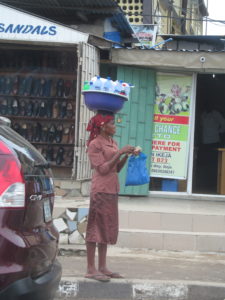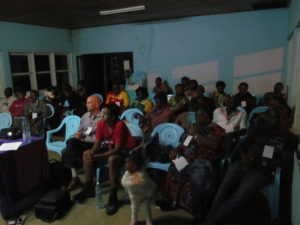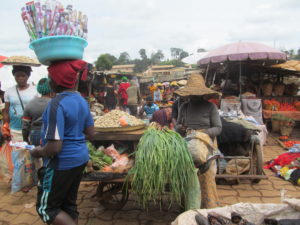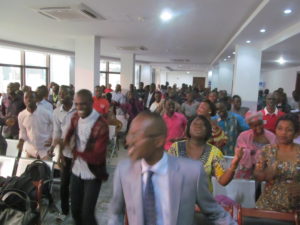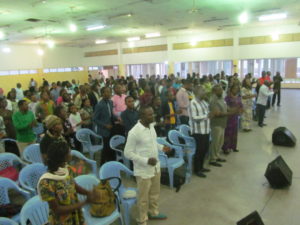Missionary Teaching Trip to Nigeria, Cameroon, Republic of Congo and DRC Journal
These are my last two days in Kinshasa. The city is back to being peaceful and I am teaching again. See below for the latest.
Missionary Teaching Trip Nigeria, Cameroon, Congo 2017
Lagos Nigeria June 28-July 3
This is my fourth visit to Lagos. It is a sprawling city on the Western coast of Nigeria with a population of just over twenty million. It is the economic and cultural heart of the most populous country in Africa. This is a very religious city, with a church on almost every corner. Most of the billboards advertise various churches. The form of Christianity here is prosperity gospel, with a charismatic flavor. The traffic here is legendary, but it is not a legend. It is true. However, I see many improvements from my past visits. Drivers have begun to obey traffic laws more or less, and the streets are in much better condition. The government here is very corrupt, but it is good to see that things have at least turned in a better direction. Of course, Nigeria is going through a very troubled time with the battle against Boko Haram militants, but this fighting is far away in the North of the country, where Islam is the dominant religion. The dominant religion in the South is Christianity.
The church I am visiting has 1800+ members and four elders. They have begun a ministry training program for the campus and singles across Western Africa, with thirty or so making a three year commitment for training and teaching. It is very gratifying to see the church planning for the future in this way. My closest friends here, of course, are the teachers Fred George and Gilbert Kimeng. I am met at the the airport by Fred. He and his wife Titi lead a region here, oversee several other churches in Nigeria and he leads the ministry training program. They are very busy. I travel from the airport directly to a midweek meeting of the Ikeja region for a class on Daniel. The traffic, not surprisingly, is very tough and we arrive after the meeting has begun. Welcome to Africa. I love it.
On Thursday I have some time to rest, followed by a midweek devotional on “the Island.” This is the business district of Lagos. I taught a class on Living by Faith from Hebrews to about two hundred.
Friday is a busy day, as I teach a class for the staff of the church and the School of Ministry students on Answering the Hard Questions (the trinity, the question of evil, of suffering, of warfare in the Old Testament and the question of hell). The questions afterward show very deep thought on these theological questions. Interaction with Muslims flavors the questions. Afterward, I have a lunch with Chris and Rolayo Ogbonaya, the lead evangelist couple for the church. We have great conversation about our dreams for the churches in Africa. Chris has a very interesting lunch. He tells me that it is cow skin. I ask, “do you mean you are eating leather?” He answers, “I guess so.” “How is it?” “A bit chewy.” “Not surprising,” I respond.
This is followed by a discussion with the four elders of the Lagos Christian Church. The church here is really blessed to have four spiritual and mature elders who have great zeal for God’s Church. They are Israel Ereola, Omo Iyamu, Omagbe Igbinoba, and Frank Okoduah. Their concern is for the spiritual growth of the churches in Nigeria. They could use more interaction with elderships outside of Nigeria. The idea of doing an exchange of elders comes up. This would be a good idea. From this meeting, I travel directly with Titi George to a midweek meeting in the Shomolu-Mushi region, Northwest of the city. They have rented land and put up a large tent for a meeting place. This is a bit of a unique experience for me. I speak to a very enthusiastic crowd of over two hundred on Freedom in Christ. The singing here is so inspiring, with dancing and intricate clapping. It is hard to describe.
Saturday included a class for the Bible group leaders on Acts and Church History and on Life in Christ. There were about three hundred in attendance, which his very impressive for leaders of a church to come out all day Saturday. From there, we hurry to the airport. I am flying with Fred George to Port Harcourt.
Port Harcourt July 1-3
Port Harcourt is the largest city in the Niger Delta region, which is in the southeast of the country. This is the center of the petroleum industry, which is the principle industry of Nigeria. Great wealth is taken from the ground here, but there is little evidence of this from seeing how the people live. This injustice explains why there has been so much political unrest in this part of the country, with much crime, kidnappings, guerilla attacks and the like. The problem has been much improved more recently, as the government has begun to invest in the people here.
As evidence of the security problem, Fred and I are escorted from the airport in a military police truck, with a machine-gun toting soldier, lights flashing and siren wailing. This is a unique experience for me, but apparently it was felt such security measures were justified.
Port Harcourt is a city of 2.3 million inhabitants. The people here are very friendly. Nigeria is the most religious country I have been in and Port Harcourt is the most religious city I have visited. There are two or three churches on every street, and almost all of the billboards (of which there are a lot!) advertises one or another church teaching the prosperity gospel. The “Bible Belt” has nothing on this city!
The church that we are visiting is led by Kemi Olufowobi and his wife Enneka. There are a bit over one hundred and ten members. By the time I arrive, the church here has already spent Friday evening and all day Saturday in a study of the Book of Romans, taught by my good friend Gilbert Kimeng. On Sunday, the building is packed to the back, with some standing outside, which is just a bit of a problem because of torrential rains. I preach on discipleship from Deuteronomy 8. After two and one-half hour church, we have a short break for lunch, but due to the rain, there was no lunch provided. Despite the fact that most had had no lunch and everyone was hungry, we had two and one-half more hours of teaching on Jesus in the Old Testament, plus many questions and answers. Overall, the service lasted almost six hours. There is clearly a great hunger for God’s word here. Several traveled several hours from other churches in the Southwest of Nigeria, including Calabar, Uyo and Yenagoa. The worship is so energetic and the singing so inspiring it is hard to describe. I strongly encourage you to consider visiting one of our sister churches here in Nigeria. Perhaps you can stay for a while to support the work here. You will be encouraged. Kemi says, “please send your teachers, elders and campus leaders to help our church.”
Monday is another day of the Bible workshop here in Port Harcourt. Most of the church is back again for three more hours of teaching. Tomorrow we will be up early to return to Lagos.
Lagos, July 4
I am up at 5:00 for a flight, along with Fred George, back to Lagos. In the evening I teach for the Island region midweek service on the Role of the Holy Spirit. This is something they have not heard much about before. Mostly they have heard that the Holy Spirit does not do, rather than what he does do. I mention to Fred that today is July 4th. He asks, “Is that Thanksgiving Day?” Tomorrow I am off for Douala, Cameroon. It has been great re-connecting with friends here in Nigeria and helping to encourage the churches in this country.
Well, it did not work out that way. My flight was cancelled and I am forced to spend one more day in Lagos. Thanks to Gilbert Kimeng for teaching my class for the church in Douala.
Douala and Bamenda, Cameroon July 5-10
This is my second visit to Cameroon. This is a principally-French-speaking country east and south of Nigeria. Of all the countries I have been in, this may well be the happiest. It is a beautiful country—quite poor and underdeveloped, yet this is a very fertile land, with plenty of food and a laid back attitude toward life. The population of Cameroon is twenty-five million, which is just slightly more than the city of Lagos alone. Douala has five million of those inhabitants. It is the principle financial city and the port of the country, but not the capital.
I was supposed to teach for the church in Douala on Wednesday, but Gilbert had to take my place because my flight was cancelled. This is just part of life when you travel in Africa. I arrive one day late. I am met by Raymond, the leader of the church here in Douala, as well as his mother and Gilbert Kimeng. We drive immediately to Bamenda for an all-Cameroon conference. Bamenda is a city of three hundred thousand in the mountains north of Douala, close to Nigeria. It, along with Limbe, is in the English-speaking part of Cameroon. The drive to Bamenda is eight hours. We start by passing mile after mile of plantations of rubber trees, palm oil and bananas. The government here has had a wise policy on agriculture. The people more than feed themselves, and make significant foreign currency selling these cash crops. After three hours, we enter the mountains, having driven past 14,000 foot Mt. Cameroon. We spend hours driving through countryside which has only a very small population. We finally arrive in Bamenda at 1:00 in the morning, to a welcome of delicious cabbage stew and rice.
Church leaders in Bimenda
At Bamenda I am blessed to meet my good friend Michael Burns and his son Elijah. He, like me, is on a teaching tour through Africa, having been in South Africa, Botswana, Zimbabwe and Zambia. We have a lot in common. On Friday we travel to the palace of the local king of the Bafu tribe. This is the king of the area who was displaced by the Germans when they took Cameroon as a colony in 1901-1907. The tour of the palace is fascination. The people were practiced human sacrifice. They were fierce warriors who also were big in the slave trade. Their current king is more or less a figurehead, but he does act as an adviser to the people. He has 48 wives and more than 140 children. Out tour is led by one of his wives. Very interesting.
Market scene in Bimenda
We race back to Bimenda for the afternoon and evening classes. The leaders of the four churches in Cameroon are here. They are Bamenda, Limbe, Douala and Yaounde. One interesting feature of this conference is that a bit over half are French-speaking and a bit less than half are English-speaking. All talks must be translated, either from or into French. Gilbert teaches a lesson from Philippians I on unity, Michael a lesson from Philippians 2 on Christ-likeness, and I do a class on Freedom in Christ.
On Saturday the general conference begins. There are many lessons, including one on Race, Culture and Christianity by Michael Burns. I do a class on Philippians 3. In the afternoon there are soccer games for men and for women. This is the national sport. The US and Cameroon are on about an equal level internationally in this sport. I am having a few stomach problems today, which is par for the course, but not enough to slow down. Sunday is worship time. The singing includes dancing and great enthusiasm, which is the African way. I give a class on Daniel, translated by Gilbert Kimeng. After this we have the eight hour drive through stunning mountains and rain forest back to Douala for a great meal of fish with Raymond and Gilbert.
Today I am off for Brazzaville, Republic of Congo. There is much need here in Cameroon. Raymond tells me that they would love to have one or two come here for the one year challenge. I heartily agree. What an adventure and what an opportunity to serve Christ it would be. The requirements? A zeal to share the gospel, a little knowledge of French (one year at the university would be sufficient) and a willingness to adapt to a culture very different from your own. Please consider this plea.
Brazzaville, Republic of Congo, July 10-13
The flight to Brazzaville is about ninety minutes. I am met by three of the campus guys, Grace, Roland and Ivon. I am immediately struck by the difference here from Nigerian and Congo. I expected this country to be at least as chaotic, but instead the streets here are broad and clean and traffic is reasonable. This causes me to wonder why. Then I see all the police and soldiers on the streets and realize the principle reason. This country has more order because it is ruled by a strong dictator who has been in power for almost forty years. The streets are not as crowded, in part, because so few can afford to buy a car. There is not much freedom here and for this reason, there has also been little development.
We must remember that there are two Congos. This is the Republic of Congo. It is a former French colony. It is the smaller of the two, but is still quite large. It is very sparsely populated, with mostly untouched or only lightly touched jungles in the inland parts. The population of the entire country is less than five million. Brazzaville has 1.7 million, which is more than a third of the entire country. Yet it is dwarfed by Kinshasa, which is right across the river. Kinshasa alone has more than twelve million inhabitants. The weather here is another surprise. It is fairly mild. The temperatures during the day while I am here are in the upper seventies or low eighties. There is a pleasant breeze. Another great surprise is that in Congo Brazzaville there is only one university in the entire country. All who go to the university travel overseas or come here to Brazzaville.
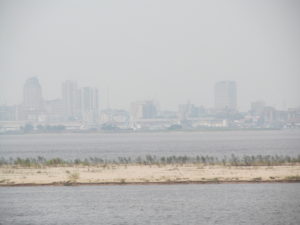 View of Kinshasa across the Congo River
View of Kinshasa across the Congo River
The church here has a little less than three hundred members. There is a sister church in Pointe Noire which also has over three hundred members. The largest group here is the campus, with about 110 students. Second largest is the teens, with about 70, followed by the singles group of about 50 and the marrieds with 46. The leader Geoffroy does not work for the church. He has a very influential job as adviser to the President of the country. Amazing. The church here is very isolated. I am the first non-African visitor in the twenty-three years since it was planted. To me it is amazing that they have done so well, with no real outside support and without full time leadership. Yet the church is so encouraging. Theirs is a relatively simple faith, as they have relatively little Bible training, but they are so devoted to God and to one another it is a strong upward call to me. They take their discipleship very seriously here, believe me.
I rush from the airport to a class for the Bible group leaders at the home of the leaders of the church here, by Geoffroy and Florence Gankoue Dzon. The teaching on Living by Faith—Hebrews 11. There are about fifty leaders at the meeting. Tuesday I tour the city a bit and take a walk to the Congo River with Grace and Freeway (an interesting name!). It is about five miles across here. I can see Kinshasa on the other side. This is the second largest river in the world. In the evening I gave a lecture for the marrieds group here on the Book of Daniel.
Wednesday includes four hours of discussion with a number of the students who have so many questions. My translators are Grace and Freeway. Both are studying English. This is followed by lunch at Geoffroy’s house of fish heads and cus cus. I then give a lecture on Acts 20 and Paul’s life to the campus and teen group, followed by a midweek service and a lesson on From Shadow to Reality. The reception is so enthusiastic, it is hard to describe. There are nearly three hundred at the lecture. Afterward, I am literally mobbed by enthusiastic members of the church. It is almost embarrassing to be honored so strongly. The desire to have biblical teaching here is palpable.
I am told that it would be possible for a young outsider to come here for a visit or even for a one year challenge. This country is very safe. Unlike the DRC, getting a visa is not difficult. There is a huge need for outside help and influence. Anyone willing to accept this challenge would be received with open arms.
On Thursday morning I head for the boat to cross to the Democratic Republic of Congo at its capital, Kinshasa.
Kinshasa Democratic Republic of Congo July 14-18
The boat ride across the Congo is about twenty-five minutes. This is truly a massive river. The current is very fast and the water is quite deep. Our boat points nearly straight up the river to travel straight across. Kinshasa is a great city of 12 million inhabitants. It is the capital of the country of eighty million. This is a very large country. Travel to Lumbumbasha in the Southeast by air is over two hours, and to the Northeast is nearly three hours. This is a former Belgian colony and the language here is French. The country has suffered from a long series of very bad governments and corruption is endemic. As with all corrupt countries, poverty is a huge problem. It is essentially impossible to drive across the country because the roads are so bad. To go very far from the capital requires either travel either by river or flying. Travel is so difficult that, for all practical purposes, Kinshasa is like an island, as travel is by water or air.
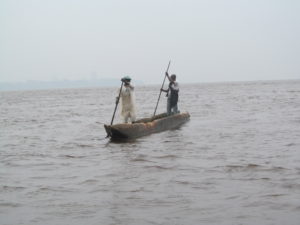 Crossing the Congo the old fashioned way.
Crossing the Congo the old fashioned way.
Our fellowship here has five churches. The largest is here in Kinshasa, with 370 members. They are led by Moses and Honore Nganda Kalala. This is a relatively mature church. I get time with Gilbert Kapongu Lukanda. He is a mature Christian who is near my own age. He and his wife have nine children. On Thursday I teach a class on Freedom in Christ to a midweek service of well over three hundred. The enthusiasm is stratospheric. They have never had a non-African teacher in well over twenty years as a church. This helps explain their hunger for Bible teaching.
Friday starts with a bit of a tour of the city. One interesting thing about this country is that it is illegal for foreigners to take photographs. I have never heard of anything like this before. It tells you a lot about the government here. Apparently, they think they have something to hide. I travel to the Protestant University of Congo with Moses. He is a student here. He is acquiring his Masters of Theology. I get to meet four of his instructors, including the number two faculty member in the Theology department. We have a discussion about a return visit so that I can speak with the faculty and students in the theology department. That would be a great honor.
Moses takes me back to the guest house. The plan for tonight is a lesson for the church leaders. Unfortunately, protests broke out today in the center of the city. There has been a sudden loss of almost fifteen percent in the value of the country’s currency. The poor, which is nearly all the people, barely survive as it is. It is understandable that they would be upset. There is rioting in the streets and shooting between protesters and the military police. Moses’ wife Honore was in the area when shots rang out. She, along with many thousands of others, rushed home for safety. Obviously, my speaking session tonight is cancelled, as it is not safe for people to be out on the streets today. While all this was happening, I had headed out on the streets for a run. No more of that for now. Moses tells me that this kind of thing is a part of life in Congo and that tomorrow things will probably be more or less back to normal. I take his word for it.
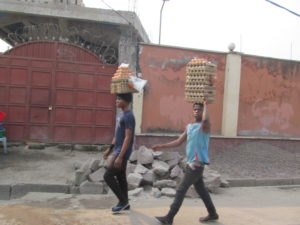 An interesting way to carry eggs.
An interesting way to carry eggs.
Moses was right. Today, Saturday, things are back to normal for Kinshasa. I get out to a market to buy some Congolese things, after which there is a class for the Marrieds on Daniel. Sunday, of course, is time to worship. The service runs from nine to twelve—just a bit over three hours. The Christians here do not seem to mind longer services. To me church seems a bit like a fashion show. The members love to dress in their very best for Sunday. I have a nice shirt and a tie and feel underdressed. I taught a class of Jesus in the Old Testament. After a break of half an hour, we are back at it again for a class from Hebrews, followed by question and answer. Altogether, the service plus class is at least five hours, but let me tell you, they would have stayed for more. The singing is amazing, of course, but the fellowship is even better. Only a very few here speak English, but still I feel like family. In the evening we have a wonderful meal with the leadership group at a restaurant owned by one of the members. This was a great Sunday.

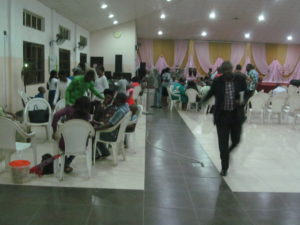 Fellowship in Ikeja
Fellowship in Ikeja